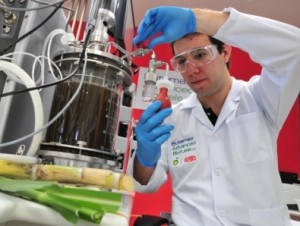 PetroAlgae has inked a deal with Haldor Topsoe to provide technology and catalysts to upgrade oils produced from PetroAlgae’s biomass through refinery coking processes and pyrolysis into drop-in renewable fuels including diesel and jet fuels. Haldor Topsoe is global company focused on the refining, petrochemical and power industries. Under the agreement, the two companies will work together to apply Haldor Topsoe catalysts, equipment, and licensed technology to upgrade oils derived from PetroAlgae’s biocrude.
PetroAlgae has inked a deal with Haldor Topsoe to provide technology and catalysts to upgrade oils produced from PetroAlgae’s biomass through refinery coking processes and pyrolysis into drop-in renewable fuels including diesel and jet fuels. Haldor Topsoe is global company focused on the refining, petrochemical and power industries. Under the agreement, the two companies will work together to apply Haldor Topsoe catalysts, equipment, and licensed technology to upgrade oils derived from PetroAlgae’s biocrude.
PetroAlgae’s micro-crop technology employs indigenous, aquatic micro-organisms suitable to local climates. The company has structured its business in such a way to enable its licensees to produce an alternative to fossil fuels as well as a high-value protein co-product, while absorbing carbon dioxide from the atmosphere.
“We are very excited to be working with Haldor Topsoe to further validate the commercial viability of our micro-crop biomass for use in refinery cokers and the production of a drop in renewable fuel,” said Dr. John Scott, Chairman of PetroAlgae. “They have extensive hydroprocessing research and development expertise from both a catalyst and a technology design standpoint and we see this agreement as just the beginning of a relationship that will help us realize the promise of our biomass as a clean and environmentally sustainable alternative to fossil fuels.”
Niels Sorensen, CEO of Haldor Topsoe A/S added, “We look forward to taking this important step with PetroAlgae toward producing renewable fuels. PetroAlgae is a leader in developing technology to produce biomass at a large commercial scale, which enables them to be cost competitive with traditional fossil fuels. Haldor Topsoe is committed to renewable fuels and we are excited about implementing projects that will help reach the goals set for renewable fuels all around the world.”











